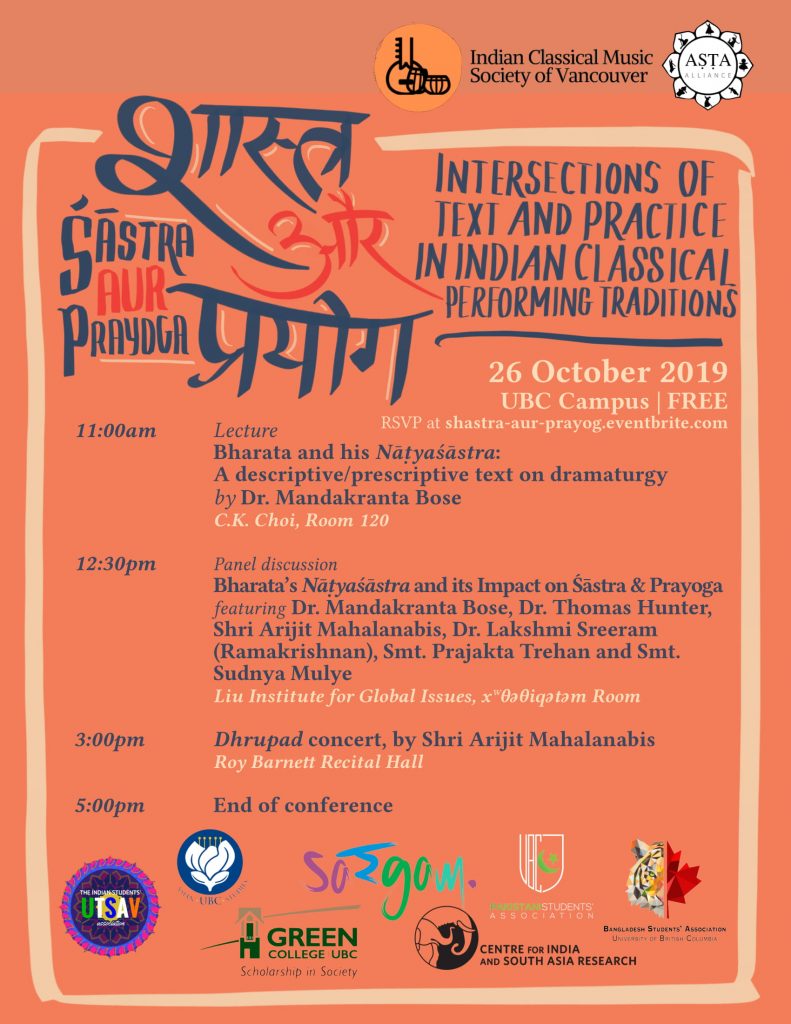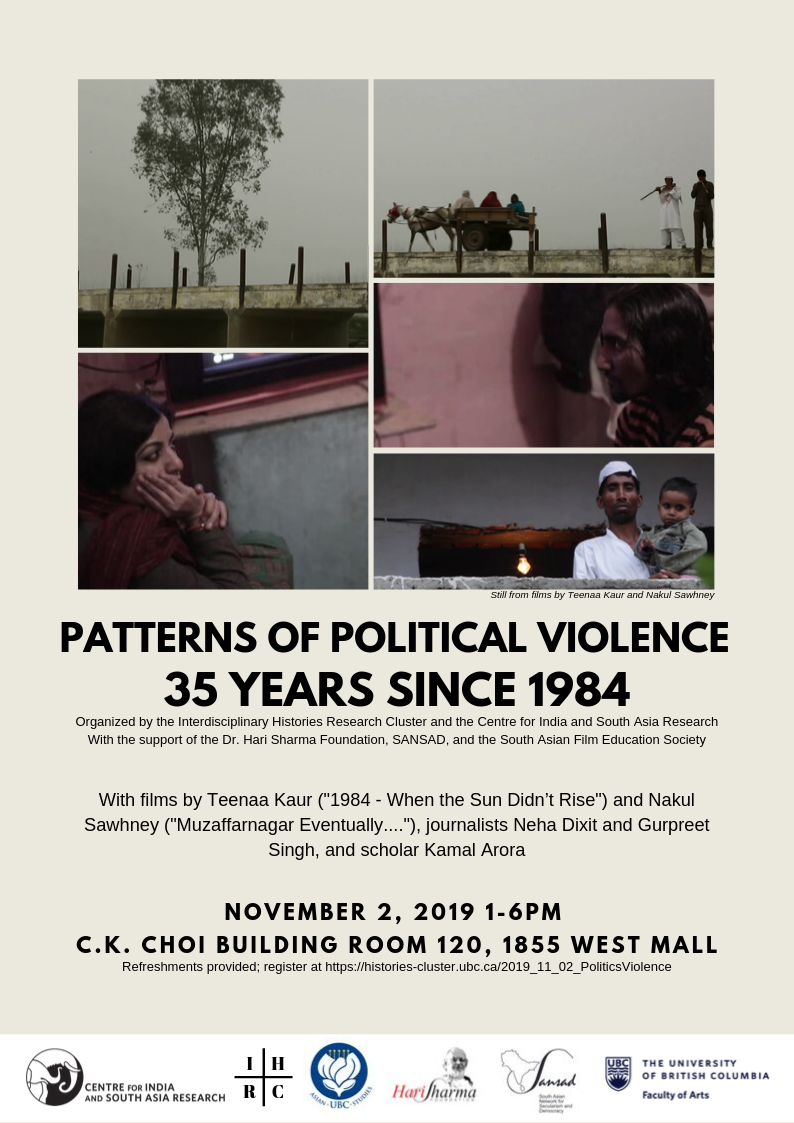|
CISAR Newsletter: October 21, 2019
|
 |
 |
This event is the third in our series with Green College, "Mehfil: Music, Text and Performance of South Asia." Stay tuned for monthly events all year long.
Date:
October 24, 2019
Time: 5
:00 PM - 6:00 PM
Location: Coach House, Green College
Presenter: Arijit Mahalanabis
Co-sponsored by: UBC Green College, Indian Classical Music Society of Vancouver (ICMSV), Asta Alliance, UBC Asian Studies, and CISAR.
Most scholars of Indian music consider dhrupad, and its cognate form dhamār, to be the oldest extant subgenres of Hindustānī music. The practice and performance of this art has grown in popularity in recent times, though a wider understanding of the art remains elusive. Practitioners, scholars, and hereditary keepers of the tradition often choose to exude an air of esotericism, rather than offering a practical and logical explanation for the objectives, structure, function, and performance of the art. In this talk, we touch on each of these aspects, particularly delving into a model of dhrupad that defines it as a musical entity in multiple dimensions. Specifically, we consider dhrupad from the perspective of alāp syllables, the tonal complex of the rāga, time and rhythm, tonal dynamics, and textual content. In each of these dimensions, we introduce a logical calculus that governs the progression of content. Taken in totality, these calculi, when followed, uniquely define a well-formed dhrupad performance. We hope that this talk will allow the attendee to more critically listen to and understand a dhrupad performance.
|
 |
Time: 12
:00 PM - 1:00 PM
Location: Liu Institute for Global Issues
Co-sponsored by: Asian Library, Alumni UBC, the Equity and Inclusion Office, and CISAR.
Diwali or Deepavali, which means "a row of lights", is the most widely celebrated festival in India and throughout the Indian diaspora. It is celebrated on Amavasya (darkest night or no moon day), it usually takes place at the end of October or the first week of November. Diwali marks the victory of good over evil, and the beginning of the New Year in India. The festival celebration, which typically lasts from five to seven days, is celebrated by several South Asian Communities, and by many Indians regardless of faith. On Diwali, people decorate their houses with diyas, candles as well as colourful lights, and they share gifts and recite prayers.
UBC students, staff and faculty members are cordially invited to experience the diversity of South Asian culture through music, henna, and delicious refreshments.
All Diwali activities are free and no registration is required.
|
 |
|

Time:
Symposium | 11:00 AM - 2:00 PM
Concert | 3:00 PM - 5:00 PM
Location: C.K. Choi 120, Liu Institute, Roy Barnett Recital Hall
Presenters: Mandakranta Bose, Thomas Hunter, Arijit Mahalanabis, Lakshmi Sreeram, Prajakta Trehan, and Sudnya Mulye
Organized by: Indian Classical Music Society of Vancouver (ICMSV) and Asta Alliance, with support from CISAR, UBC Green College, UBC School of Music, UBC Bangladeshi Students Association, UBC Pakistani Students Association, UTSAV - UBC Indian Students Association, and UBC Sargam.
The Shastra Aur Prayoga Conference aims to explore the intersections between text and practice in Indian performing art traditions by bringing together academics, musicians, dancers, and connoisseurs in dialogue. The conference is unique in its approach, analyzing topics in Indian classical performing arts through a interdisciplinary lens. It represents the breadth of geographies Indian classical performing arts extends its reach within and outside of India.
The conference is divided into a symposium and a concert. The symposium constitutes of a lecture by Mandakranta Bose (
Bharata and his Nāṭyaśāstra: A descriptive/prescriptive text on dramaturgy), and a panel discussion with scholars, musicians, and dancers (
Bharata's Nāṭyaśāstra and its Impact on Śāstra and Prayoga). The concert will feature Arijit Mahalanabis (Dhrupad Vocals) and his student Kishan Patel (Pakhawaj).
|
 |

Date:
November 2, 2019
Time: 1:00 PM - 6:00 PM
Location: C.K. Choi 120
Presenters: Teenaa Kaur and Nakul Sawhney
Organized by the Interdisciplinary Histories Research Cluster, in collaboration with the Centre for India and South Asia Research, the Department of Asian Studies, and with the support of the Office of the Dean of Arts, SANSAD, and the Dr. Hari Sharma Foundation.
This event addresses the violence against Sikhs in India in 1984 and the ways in which political violence has been enacted before and since in the context of the post-colonial state of India, for a day-long event. It features two filmmakers to screen and discuss their films, as well as talks by/interaction with one scholar and two journalists whose work intersects with these patterns of political violence. Teenaa Kaur's film, "1984 - When the Sun Didn't Rise," provides a comprehensive account of the Sikh women in Delhi who survived the 1984 massacre and their continuing fight for justice. Nakul Sawhney's "Muzaffarnagar Baaqi Hai" or "Muzaffarnagar Remains," documents the orchestrated "riots" against Muslims in a small city in Uttar Pradesh, an incident that is widely held to have enabled the victory of the Bharatiya Janata Party or BJP at the national level in 2014. Neha Dixit is an independent journalist who has done ground-breaking work on violence against women and communal violence in India; in 2016 she exposed the trafficking of adivāsī girls for "hinduization." Kaur, Sawhney and Dixit will be joined by local scholar Kamal Arora (Ph.D., UBC), whose dissertation addresses the experience of women in the "women's colony" that Kaur's film addresses, and Gurpreet Singh, a local journalist who has written widely on politics and violence in India today -- and connections to the Indo Canadian community.
|
 |
Date: November 7, 2019
Time: 5:00 PM - 6:30 PM
Location: C.K. Choi 120
Presenter: Farah Shroff
Will the re-emergence of traditional health knowledge in India, in the form of the AYUSH Ministry and otherwise, improve the health of women and children? Maternal and Infant Health Canada is studying this question with our partners in India and we'll present our ideas in progress. Want to hear life stories of Parsi women? The ZXX project is an oral herstory study conducted by and for the Parsi community. We'll discuss the project and it's Canadian and Indian participants.
|
 |
Due Date: October 25, 2019 at 4:00 PM
The Centre for India and South Asia Research (CISAR) at The University of British Columbia invites submissions for the 2019 Nehru Humanitarian Graduate Scholarship in Indian Studies. The annual $1,000 scholarship is offered by Dr. and Mrs. D. P. Goel to a graduate student pursuing the political, historical, economic, religious, social, or cultural study of India. The award is made on the recommendation of the Faculty of Graduate and Postdoctoral Studies, in accordance with findings of the Adjudication Committee of the Centre for India and South Asia Research.
|
Deadline: November 15, 2019
SACPAN 2020 will take place at Simon Fraser University Vancouver, 28-29 February 2020, with special opening event on February 27. This year's theme is "GAPS, FRONTIERS, and BLINDSPOTS in SOUTH ASIAN STUDIES."
|
CISAR Graduate Student Travel Grant 2019-20
Due Date: November 15, 2019
The Centre for India and South Asia Research offers 2 conference/workshop travel grants per year at up to $500 each for current graduate students at UBC to support travel to present papers on topics related to any part of South Asia or the South Asian Diaspora. Applications due November 15, 2019.
Recipients of the travel grant will be invited to speak in the annual seminar series at CISAR.
|
 |
Call for Submissions: An Asian Perspective
Due Date: November 17, 2019
The Asia Pacific Youth Council is organizing a film night with the objective of highlighting Asian heritage and identity. If you have created short films that talk about Asia, or you are a filmmaker of Asian heritage, we invite you to submit your film to us.
If selected, we APYC will screen your film, provide a $100 honorarium. and invite you to talk about your work alongside your peers from other local institutions at a public event.
Criteria:
- Short film (max. 30 min)
- Student/Alumni of a local institution (UBC, SFU, ECUAD, etc)
Films pertaining to all areas and people of Asia (ex: South, West, East, etc.) are encouraged.
Please email Chandima Silva at
[email protected]
for more information or if you have any questions.
|
 |
Join the Canadian South Asian Studies Association (CSASA)
South Asianists from across Canada gathered last June at UBC, and decided together to establish a national scholarly association for faculty actively researching and teaching on South Asia-Canada and graduate students enrolled in related Canadian M.A. and Ph.D. programmes, to be known as the Canadian South Asian Studies Association (CSASA) as a non-profit member affiliated with the
Canadian Federation for the Humanities and Social Sciences. Ideally, we hope to have some kind of CSASA presence at the next
Congress (2020), at Western University.
As a first step, all graduate students, faculty members, and researchers with research interests in South Asia are invited to join CSASA-L, a newly created listserv hosted at Athabasca University, where subscribers can share professionally relevant information related to teaching, research, resources, and events on South Asia-Canada. If you would like to join, please read the
listserv rules and enter your
subscription details.
|
 |
 |

Facilitators: Suyesha Dutta and Morgan Khan
Supervisor: Dr. Anne Murphy
Course Title: ASIA 476Z 001 and HIST 390A
When: Term 2
Days: Tuesday/Thursday
Time: 12:30 - 2:00pm
Room: IKB 191
Postcolonial and Subaltern Studies have been important in critiquing the nation and its citizens. These have also helped critique the nationalist project that drives the Indian state. In this course, we will critically read and compare approaches based on the changing nature of subaltern studies, socio-economic and socio-cultural identity formation, and the way dissent manifests itself in India. While there are a number of classes dealing with the history of pre-independence India, there is a marked absence of classes dealing with the history of India post-partition. Abandoning the narrative at this time of deep divide needs to be rectified, and thus allowing students to explore the history and politics that resulted from the scars rendered by the Partition. It also enables students to engage with, and garner a deeper understanding, of the long reaching effects of colonialism, as they play out in the modern history of a post-colonial geography. We hope that this class will fill the gap speaking to the modern history of the Indian subcontinent.
Readings will draw on historiography, social theory, political economy, colonial and postcolonial studies, ethnography, and governance. Course material will be largely key secondary material although this will be supplemented with some primary material. The course is organised thematically rather than strictly chronologically, so that students will find it an advantage to have some awareness of the general history of colonial and post-colonial India. Evaluation will be based on class participation, a presentation of weekly readings (done once or twice through the semester), a final research project proposal (peer-graded), and its presentation thereafter.
This course does not require a prerequisite, but requires a submission of an expression of interest. Please send a statement of interest in about 500 words to
[email protected], briefly expressing your interest in the course and how you would be able to contribute to this seminar. The course is appropriate for students across every region and/or discipline.
|
 |
|
We've compiled a list of courses for Winter 2019/2020 with South Asia content. You can checkout the list
here.
If you're a UBC faculty member teaching a course with content pertaining to South Asia, feel free to contact us to list it on the CISAR website.
|
Our 2018-2019 Annual Report is ready! Take a look at last year's events and activities, with special new highlights on South Asia-related programs across UBC -- and learn more about CISAR's work.
|
|